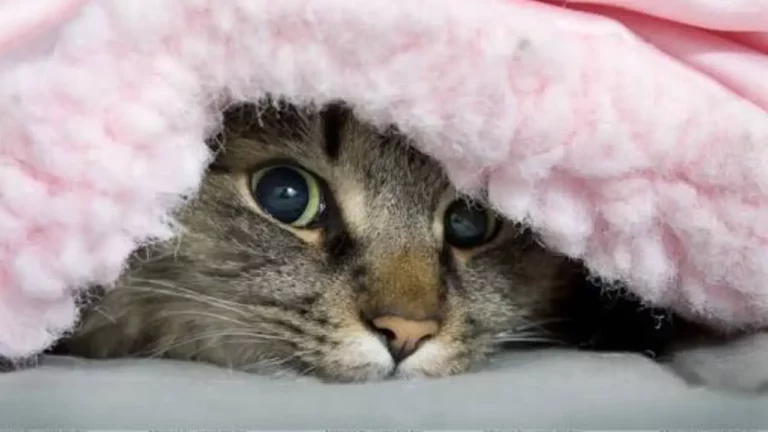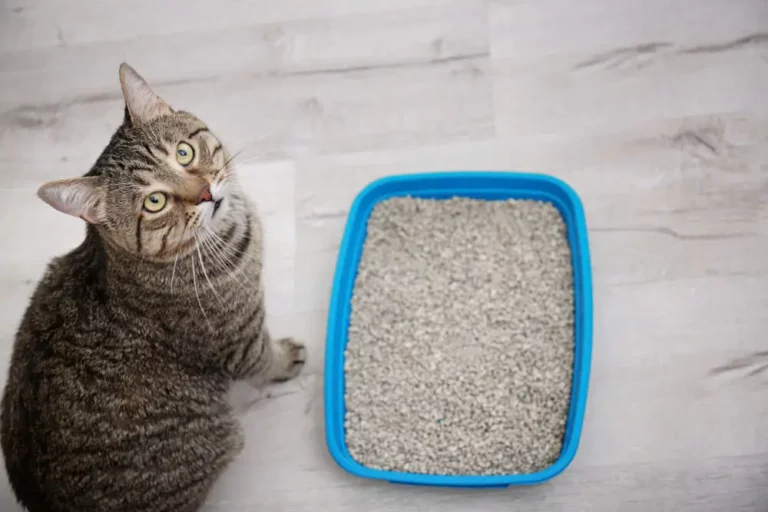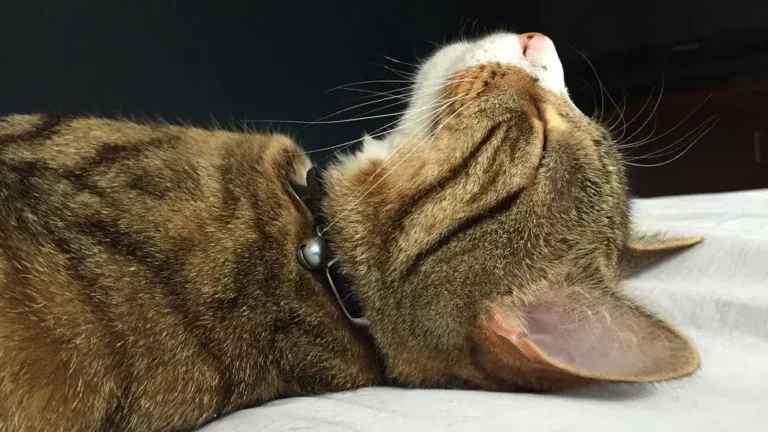Why Do Mom Cats Bite Their Kittens’ Neck?
Have you ever wondered why mother cats bite their kittens’ neck? This behavior is part of a natural instinct that helps keep the kittens safe and can be seen across many species. It has also evolved over millions of years to ensure the survival of tiny kittens as they grow and mature.
When a mother cat has her kittens, she will usually start by licking them to stimulate breathing and then afterwards, she may bite the back of their necks. This is called ‘scruffing’, and it serves two purposes. Firstly, it helps to keep the kitten still so that mom can move or transport them easily if needed. Secondly, it may help to reinforce the bond between the mother cat and her kittens through the release of hormones associated with pleasure during such contact.
Mother cats may bite their kittens’ necks is thought to stimulate the kittens and help them with proper development – stimulating hormones, better coordination, and even helping them learn to socialize in a controlled manner. It can also be used as a form of discipline, or as a means of asserting dominance and teaching the kit boundaries.
Let’s take a look at this is in more detail…
Why Do Mother Cats Bite their Kittens’ Neck? – Overview
Biting the neck of their kittens is actually normal behavior for mom cats. It is an instinctual behavior in cats, known as “neck-biting,” or “scruffing.”
Scruffing generally occurs during play or when the cat is trying to get its kittens to follow her. This behavior is a normal form of communication for cats, intended to demonstrate that the kitten is part of their family — a show of love and protection.
Biting the back of the neck or scruff of her kittens’ necks can be a way for the mom cat to move them from one place to another.
Mother cats also bite their kittens’ necks as a way of displaying dominance and affection. This behavior is typically seen as gentle and cautious, but it can also be a signal to the kittens that they must obey their mother. The mother cat may do this to assert her authority or show her acceptance of the kittens.
Additionally, the bite mark left by a mother cat can help reinforce scent recognition for the kittens and may even protect them from harm if other animals recognize her mark on them.
It also helps her to get them into the right position for nursing and is also used in teaching the kittens how to socialize. It is important to note that this behavior should not be seen as aggressive—it is actually a sign of affection.
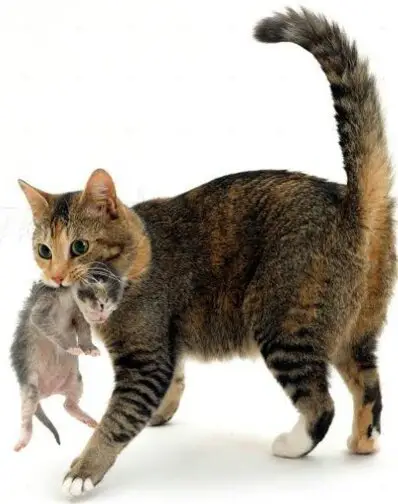
The Evolutionary Significance of Neck-Biting
Neck-biting has been observed in domestic cats and felines in the wild and is believed to have an evolutionary significance of enabling mother cats to move her young securely.
This is believed to be especially important as a way of carrying unweaned kittens, which cannot otherwise grip or hang on with their claws. It also helps ensure the survival of her litter.
Through evolutionary biology research, it has also been determined that neck biting serves as a form of communication between mothers and their kittens. The neck bite is a mother’s way of displaying dominance in her litter and teaching her kittens how to behave.
It is also used as a grooming tool by cats to distribute oils from their mouths over their fur. If a kitten refuses to obey its mother’s commands, the mother may increase the severity of the bite to enforce her authority.
By biting the kitten’s neck, mom cats help kittens bond with their littermates, teach independence and develop bite inhibition, an important trait in the wild that helps adults recognize their kin. It also helps cats remain aware of their environment and hone their hunting skills.
When feeding, mother’s bite gives her control over the amount of milk a kitten consumes, ensuring that each one receives enough nutrition without drinking too much from the limited supply.
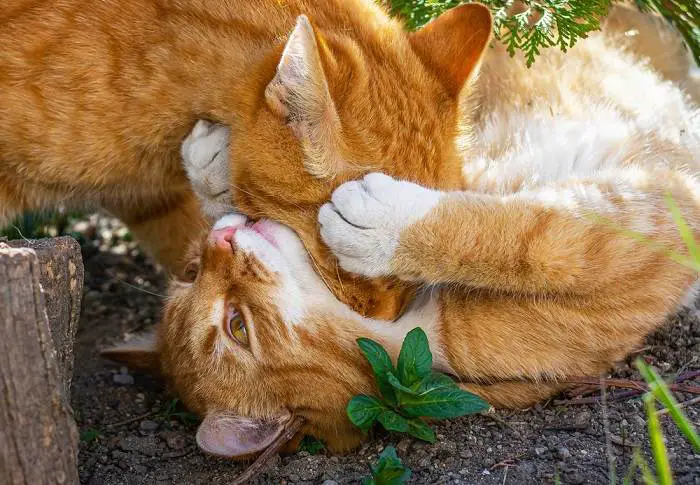
How to Make Sure Your Cat’s Necks are Safe and Sound
It’s important to ensure that your cat’s neck is properly taken care of to ensure their safety. Start by giving them regular veterinary check-ups.
Also, watch out for signs of irritation or inflammation near the neck, as this could be an indication of an underlying issue.
Understanding the Social Structure of Feline Families
It is believed that mother cats bite their kittens’ necks in order to not only teach them how to fend for themselves, but also to instil the importance of a social structure within the feline family.
This behavior is most frequently seen when kittens have reached three weeks of age, as this signals their independence and need to learn how to survive outside of the home.
Additionally, it is thought that by biting the necks of their offspring, mother cats help create an environment filled with trust and respect.
Giving Kittens Room to Grow Up Healthily and Securely
For a kitten to grow up healthy and secure, the mother cat needs to teach them vital survival skills. A mother cat biting her kittens’ necks prepares them for life in the wild and allows for independence.
Obviously, this isn’t needed for domestic cats, but the behavior has remained throughout their evolution.
The action also creates a sense of respect among the feline family, with each individual having its own place in the group structure. This trust is essential for cats to interact comfortably amongst one another and develop an understanding of boundaries between each other.
Is It Possible for My Cat to Harm a New Kitten?
As mentioned above, new mom cats often bite their kittens around the neck as a form of discipline or to assert dominance.
Other times, she will bite her kittens’ necks to show affection in a way similar to the way she licks them.
In either case, this behavior is typically harmless and is necessary for the cat mom’s parenting skills!
Furthermore, the bites are usually not too hard or intended to hurt, but rather just enough pressure to keep the kitten safe and secure.
Why Do Male Cats Bite the Throats of Female Cats?
Mom cats often bite their kittens on the neck as a means of showing motherly love and care. It is a natural instinct for cats to show dominance in this way, similar to how male cats will bite the throat of female cats before mating. This type of bite can also be referred to as a “love bite“.
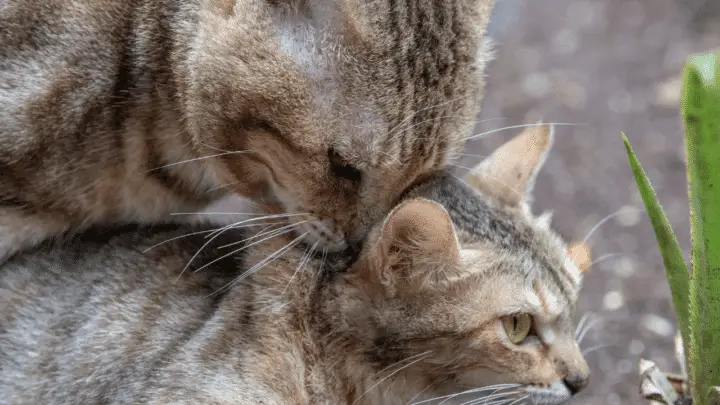
Why Do Domestic Cats Become Aggressive and Bite?
Aggression, which may or may not be seen in this kind of behavior, depends on a variety of factors including early social history and exposure to humans and other animals, gender, social context, handling and personality.
Although cats may seem to be friendly, they can sometimes become aggressive. This can manifest in the form of biting, growling and swatting. Common reasons why cats become aggressive are fear, anxiety or a desire to protect their territory.
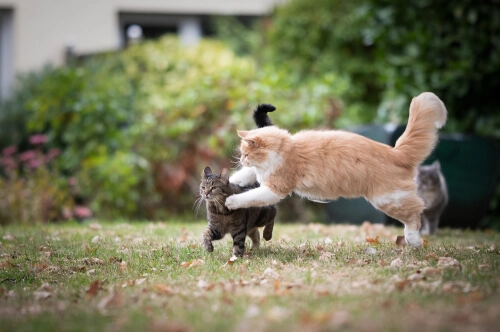
While cats are generally gentle and passive, they can become aggressive when frightened or provoked. Common triggers for aggression include territoriality, changes in environment, illness or injury, lack of socialization, a lack of mentally stimulating activities or predatory outlets.
In addition, cats may display aggressive behavior due to illness or injury, fear of unfamiliar people or pets, and environmental stressors such as loud noises.
It’s important to recognize the signs of aggression in your cat so that you can properly manage their behaviour. Knowing the causes of aggression can help owners better understand their cat’s behavior and work to alleviate the problem.
How to Deal with Cat Aggression
Mother cats naturally exhibit a protective behaviour known as ‘bunting‘ when they interact with their kittens. This is when they place the side of their head against the kitten’s neck.
It is believed that this bunting behavior stimulates the kitten’s nervous system and helps to instil important survival skills in the kitten. It may also be used as a form of discipline by mama cats, such as if her kittens are being too rambunctious or not listening to her warnings.
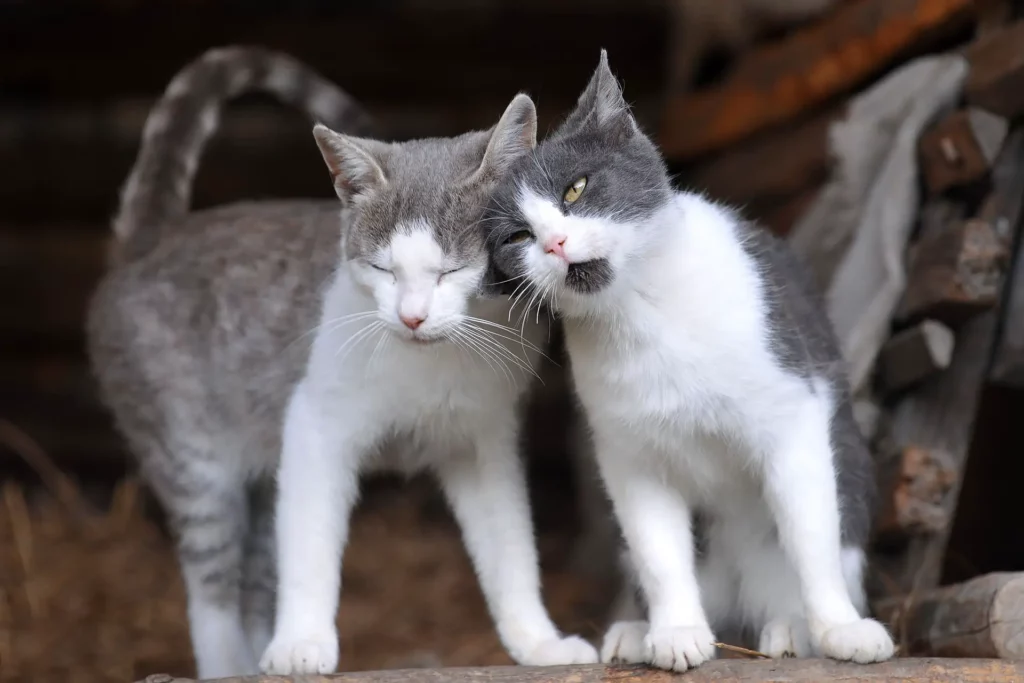
If you’re concerned about your cats’ aggressive behaviour, identify anything in their environment that might be irritating or stressing them out, such as images or loud noises. Doing this can help reduce any negative triggers and improve their overall wellbeing.
Frequently Asked Questions
Why do cats bite kittens?
Cats may bite kittens when they feel threatened or to express dominance. It is normal behavior for cats, but it can be alarming to witness. Care should be taken to ensure that both cats and kittens remain safe when in close proximity to one another as a cat’s bite can cause injury or even death if not monitored properly.
Why is my cat aggressive towards her kittens?
In some cases, a mother cat may become aggressive towards her kittens if she is feeling overwhelmed or stressed. This can happen when there are too many kittens in the litter or if there isn’t enough food or shelter available.
Other signs of stress or anxiety that could lead to aggressive behavior include loud noises, changes in routine, and the presence of unfamiliar cats. It’s important to observe your cat carefully to determine what is causing her stress so you can help her feel more secure and relaxed.
Why do cats grab kittens by the neck?
Cats often grab their kittens by the neck in order to show dominance. It is also a way for cats to protect and move their kittens, as they can safely pick them up and are able to take control of the situation. By picking up their kittens, cats can keep them safe from any potential threats.
Why Do Mom Cats Bite Their Kittens Neck? – Summary
Why do mom cats bite their kittens’ necks? It is an instinctual behavior designed to establish dominance within the litter.
A mother cat will bite her kitten’s neck while they are playing, as a way of telling them that she is in charge.
This type of discipline helps the kittens understand their place within the litter and social hierarchy and provides important guidance for learning boundaries.
Mother cats gently bite their kittens’ necks to encourage nursing and keep them in one place. This practice is known as “queening” and has several purposes.
Primarily, it helps mother cats’ bond with their litter while stimulating the production of hormones that help the kittens learn to nurse.
The bite also serves as a reminder to stay still so they can feed, and the gentle yet firm pressure keeps them calm and comfortable.
Mother cats are instinctually driven to bite their kittens’ necks in order to provide them with necessary grooming and attention, as well as to give them comfort and security.
By biting the neck of a kitten, a mother cat is able to leave her own scent on it, which serves as an identifier when later introducing the kittens into larger groups.
Additionally, if a mother cat notices that her kittens are being too rambunctious or playing too roughly with one another, she may use a gentle neck bite in order to prompt them away from each other.
Thanks for reading! If you have any other thoughts on this topic, please don’t hesitate to comment below!

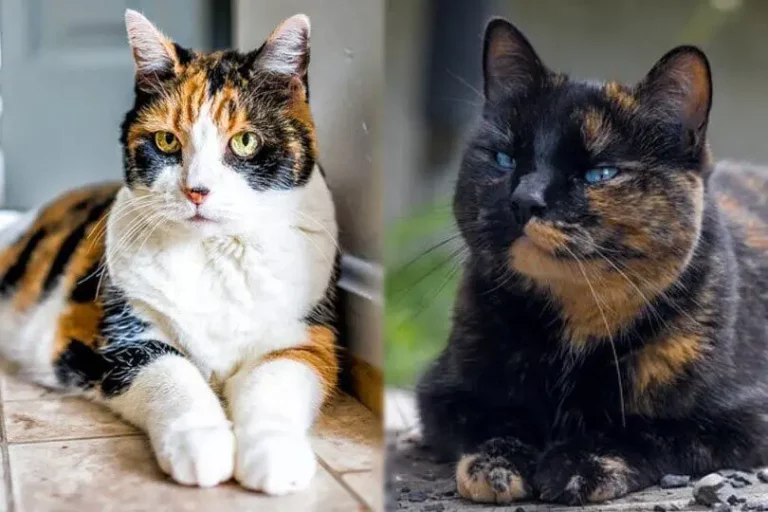
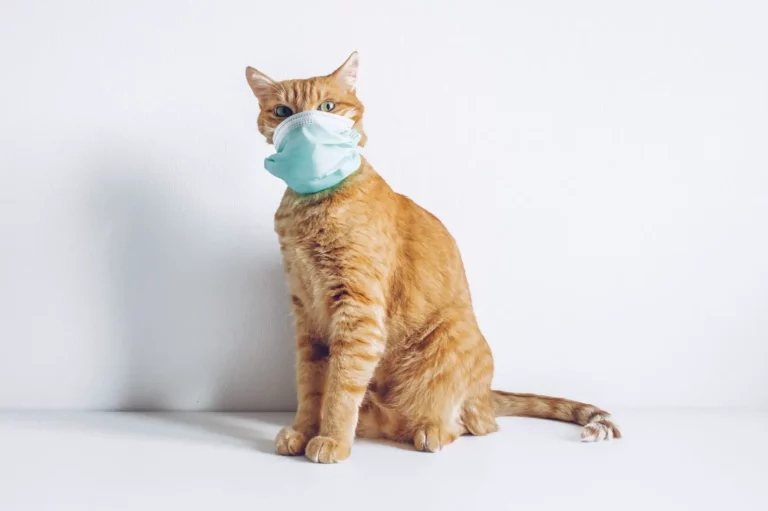
![Why Does My Cat Like To Smell My Breath? [4 Reasons]](https://www.warmlypet.com/wp-content/uploads/2023/01/Why-Does-My-Cat-Like-To-Smell-My-Breath.webp)
